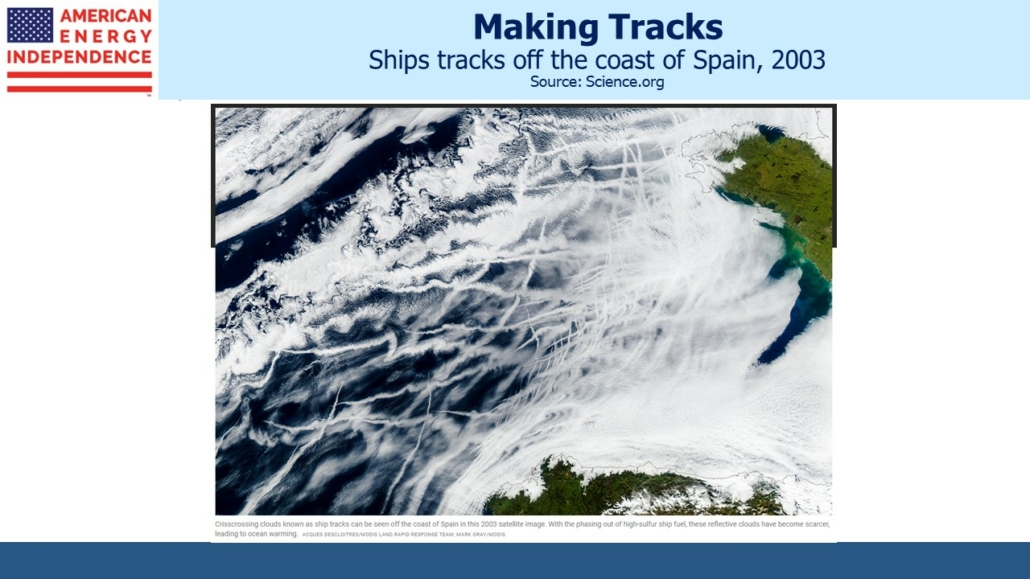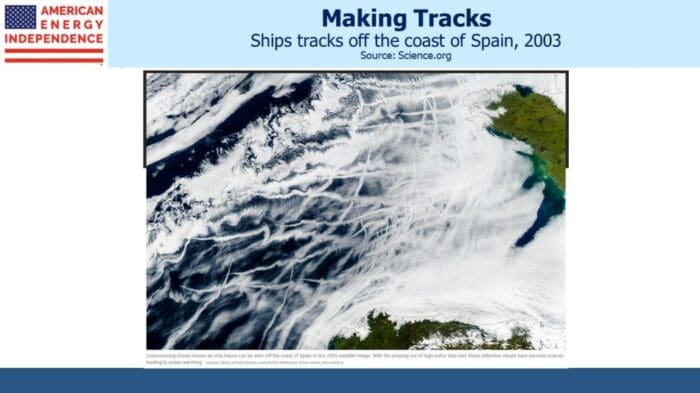Government regulations play a big role in energy markets. Although concern about climate change is part of the political discourse in every democracy, consumers and businesses aren’t going to reduce their emissions without tax credits, incentives and rules to modify behavior.
Sometimes policies can have unintended consequences. Take ships, which mostly use heavy, bunker fuel to provide power. In 2020 new rules written by the International Maritime Organization (IMO) came into effect sharply limiting the sulphur content of ships’ fuel to 0.5%, versus 3.5% previously. Airborne sulphur is a pollutant that can harm people with cardiovascular problems living near ports. Sulphur dioxide is a greenhouse gas. The new IMO regulations were intended to improve air quality and to reduce the maritime industry’s carbon footprint.
It sounded very sensible. But some scientists now think this is increasing global warming, and may even be responsible for the exceptionally warm Atlantic waters off the US east coast and on Ireland’s west coast.

“Ship tracks” are formed when ships move across the ocean. The sulphate particles ships emit seed clouds, creating a trail of reflective, cloud-like vapor behind them. These clouds reduce the amount of sunlight reaching the earth’s surface. The reduced sulphur content of bunker fuel required by the IMO means fewer ship tracks and has inadvertently allowed more sunlight through. In some areas it could have added as much as 50% of the warming impact of human-generated CO2.
If one day our descendants decide the planet is too hot, they may resort to geoengineering which could include seeding clouds on a vast scale to try and reflect more of the sun’s heat back out to space. The IMO regulations have unwittingly created a geoengineering experiment with the opposite effect. There have even been suggestions that ships should emit salt droplets as they move, to seed more ship tracks and undo the possible damage caused by their lower emissions.
Sometimes you just can’t make this stuff up.
Canada has been frustrated for years in its efforts to transport the heavy crude produced in Alberta to global markets. The Keystone XL was intended to be a solution until President Biden canceled it on his first day in office. Kinder Morgan wisely sold the TransMountain expansion (see Canada Looks North to Export its Oil) to the Canadian federal government in 2018. British Columbia didn’t want Albertan oil passing through its province, and the protracted political dispute eventually persuaded Kinder Morgan to give up on the project. Once the Canadian government took over vast cost increases took the project’s cost up by more than 4X. It is expected to go into service next year transporting crude from Alberta to the Westridge export terminal on British Columbia’s Pacific coast.
RBN Energy publishes a terrific blog for readers keen for a more technical explanation of markets, midstream logistics and the physics of this sector. In a fascinating post (unfortunately behind a paywall), RBN explains the challenges with getting the crude oil from Westridge into the wide blue ocean. The challenges are many. Ships must traverse a narrow channel to reach the Pacific. It’s constrained by depth and also height (because of two bridges). Bigger ships are more cost effective, but the 245 meter Aframax class is the largest ship allowed in Vancouver harbor. The biggest class of oil tanker, an Ultra Large Crude Carriers (ULCC), is 415 meters long and has over four times the carrying capacity of the Aframax.
Alberta’s heavy crude is, well, heavy. The 42 foot depth of the Burrard Inlet, through which the ships must pass, is less than the 49 foot draft of a fully laden Aframax, so they’ll have to operate at less than full capacity. Once outside the harbor some may even move their cargo of oil onto a bigger ship like a ULCC (called reverse lightering) for more cost-effective transport to their Asian buyers.
The complexity and cost of moving the world’s energy are largely hidden from view. Canada’s fractured politics have significantly boosted the cost of getting their oil exports to market.
Finally, Britain’s Conservative government seems to be quietly backing away from some of the more extreme commitments made in the past regarding emissions. The UK is ahead of many other countries, having phased out coal. Offshore windpower is at times its biggest source of electricity. The North Sea is a blustery place.
Britain has a system of carbon credits, and before Brexit their price tracked the EU equivalent quite closely. Now free of oversight from bureaucrats in Brussels, a weakening of regulations has caused UK carbon credits to drop to around half the EU price. This signals less urgency by British CO2 emitters to buy credits. UK PM Sunak may be quietly pursuing more pragmatic policies to try and boost GDP growth which has lagged peers for a decade (see UK government cuts cost of polluting in latest anti-green move). Nothing official has been said. But there’s a clear pattern around the world of voters pushing back once extreme green policies start to have an excessive economic impact.
—
Originally Posted August 16, 2023 – Governments And Their Energy Policies
Important Disclosures
The information provided is for informational purposes only and investors should determine for themselves whether a particular service, security or product is suitable for their investment needs. The information contained herein is not complete, may not be current, is subject to change, and is subject to, and qualified in its entirety by, the more complete disclosures, risk factors and other terms that are contained in the disclosure, prospectus, and offering. Certain information herein has been obtained from third party sources and, although believed to be reliable, has not been independently verified and its accuracy or completeness cannot be guaranteed. No representation is made with respect to the accuracy, completeness or timeliness of this information. Nothing provided on this site constitutes tax advice. Individuals should seek the advice of their own tax advisor for specific information regarding tax consequences of investments. Investments in securities entail risk and are not suitable for all investors. This site is not a recommendation nor an offer to sell (or solicitation of an offer to buy) securities in the United States or in any other jurisdiction.
References to indexes and benchmarks are hypothetical illustrations of aggregate returns and do not reflect the performance of any actual investment. Investors cannot invest in an index and do not reflect the deduction of the advisor’s fees or other trading expenses. There can be no assurance that current investments will be profitable. Actual realized returns will depend on, among other factors, the value of assets and market conditions at the time of disposition, any related transaction costs, and the timing of the purchase. Indexes and benchmarks may not directly correlate or only partially relate to portfolios managed by SL Advisors as they have different underlying investments and may use different strategies or have different objectives than portfolios managed by SL Advisors (e.g. The Alerian index is a group MLP securities in the oil and gas industries. Portfolios may not include the same investments that are included in the Alerian Index. The S & P Index does not directly relate to investment strategies managed by SL Advisers.)
This site may contain forward-looking statements relating to the objectives, opportunities, and the future performance of the U.S. market generally. Forward-looking statements may be identified by the use of such words as; “believe,” “expect,” “anticipate,” “should,” “planned,” “estimated,” “potential” and other similar terms. Examples of forward-looking statements include, but are not limited to, estimates with respect to financial condition, results of operations, and success or lack of success of any particular investment strategy. All are subject to various factors, including, but not limited to general and local economic conditions, changing levels of competition within certain industries and markets, changes in interest rates, changes in legislation or regulation, and other economic, competitive, governmental, regulatory and technological factors affecting a portfolio’s operations that could cause actual results to differ materially from projected results. Such statements are forward-looking in nature and involves a number of known and unknown risks, uncertainties and other factors, and accordingly, actual results may differ materially from those reflected or contemplated in such forward-looking statements. Prospective investors are cautioned not to place undue reliance on any forward-looking statements or examples. None of SL Advisors LLC or any of its affiliates or principals nor any other individual or entity assumes any obligation to update any forward-looking statements as a result of new information, subsequent events or any other circumstances. All statements made herein speak only as of the date that they were made. r
Certain hyperlinks or referenced websites on the Site, if any, are for your convenience and forward you to third parties’ websites, which generally are recognized by their top level domain name. Any descriptions of, references to, or links to other products, publications or services does not constitute an endorsement, authorization, sponsorship by or affiliation with SL Advisors LLC with respect to any linked site or its sponsor, unless expressly stated by SL Advisors LLC. Any such information, products or sites have not necessarily been reviewed by SL Advisors LLC and are provided or maintained by third parties over whom SL Advisors LLC exercise no control. SL Advisors LLC expressly disclaim any responsibility for the content, the accuracy of the information, and/or quality of products or services provided by or advertised on these third-party sites.
All investment strategies have the potential for profit or loss. Different types of investments involve varying degrees of risk, and there can be no assurance that any specific investment will be suitable or profitable for a client’s investment portfolio.
Past performance of the American Energy Independence Index is not indicative of future returns.
Disclosure: SL Advisors
Please go to following link for important legal disclosures: http://sl-advisors.com/legal-disclosure
SL Advisors is invested in all the components of the American Energy Independence Index via the ETF that seeks to track its performance.
Disclosure: Interactive Brokers Third Party
Information posted on IBKR Campus that is provided by third-parties does NOT constitute a recommendation that you should contract for the services of that third party. Third-party participants who contribute to IBKR Campus are independent of Interactive Brokers and Interactive Brokers does not make any representations or warranties concerning the services offered, their past or future performance, or the accuracy of the information provided by the third party. Past performance is no guarantee of future results.
This material is from SL Advisors and is being posted with its permission. The views expressed in this material are solely those of the author and/or SL Advisors and Interactive Brokers is not endorsing or recommending any investment or trading discussed in the material. This material is not and should not be construed as an offer to buy or sell any security. It should not be construed as research or investment advice or a recommendation to buy, sell or hold any security or commodity. This material does not and is not intended to take into account the particular financial conditions, investment objectives or requirements of individual customers. Before acting on this material, you should consider whether it is suitable for your particular circumstances and, as necessary, seek professional advice.
Disclosure: Futures Trading
Futures are not suitable for all investors. The amount you may lose may be greater than your initial investment. Before trading futures, please read the CFTC Risk Disclosure. A copy and additional information are available at ibkr.com.



















Join The Conversation
For specific platform feedback and suggestions, please submit it directly to our team using these instructions.
If you have an account-specific question or concern, please reach out to Client Services.
We encourage you to look through our FAQs before posting. Your question may already be covered!